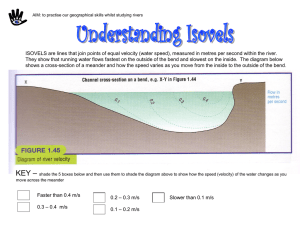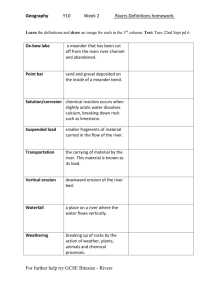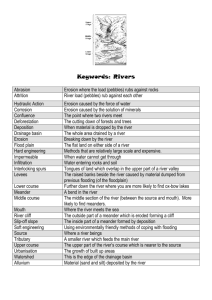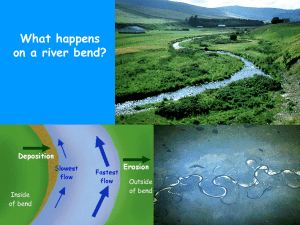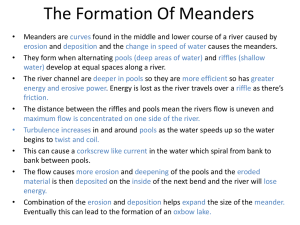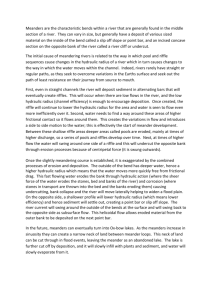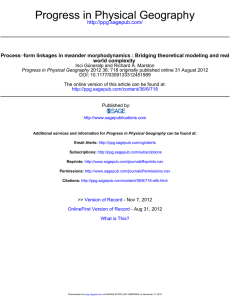Meadow Meander pedagogy project: developing a ‘living laboratory’ for Warwick campus
advertisement
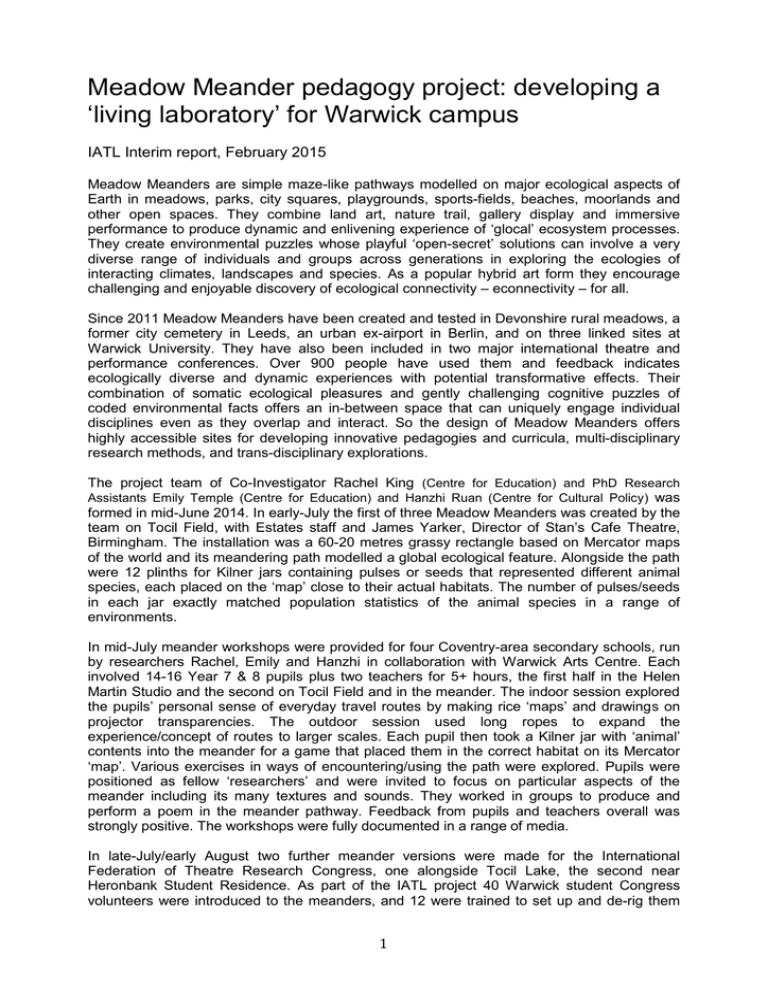
Meadow Meander pedagogy project: developing a ‘living laboratory’ for Warwick campus IATL Interim report, February 2015 Meadow Meanders are simple maze-like pathways modelled on major ecological aspects of Earth in meadows, parks, city squares, playgrounds, sports-fields, beaches, moorlands and other open spaces. They combine land art, nature trail, gallery display and immersive performance to produce dynamic and enlivening experience of ‘glocal’ ecosystem processes. They create environmental puzzles whose playful ‘open-secret’ solutions can involve a very diverse range of individuals and groups across generations in exploring the ecologies of interacting climates, landscapes and species. As a popular hybrid art form they encourage challenging and enjoyable discovery of ecological connectivity – econnectivity – for all. Since 2011 Meadow Meanders have been created and tested in Devonshire rural meadows, a former city cemetery in Leeds, an urban ex-airport in Berlin, and on three linked sites at Warwick University. They have also been included in two major international theatre and performance conferences. Over 900 people have used them and feedback indicates ecologically diverse and dynamic experiences with potential transformative effects. Their combination of somatic ecological pleasures and gently challenging cognitive puzzles of coded environmental facts offers an in-between space that can uniquely engage individual disciplines even as they overlap and interact. So the design of Meadow Meanders offers highly accessible sites for developing innovative pedagogies and curricula, multi-disciplinary research methods, and trans-disciplinary explorations. The project team of Co-Investigator Rachel King (Centre for Education) and PhD Research Assistants Emily Temple (Centre for Education) and Hanzhi Ruan (Centre for Cultural Policy) was formed in mid-June 2014. In early-July the first of three Meadow Meanders was created by the team on Tocil Field, with Estates staff and James Yarker, Director of Stan’s Cafe Theatre, Birmingham. The installation was a 60-20 metres grassy rectangle based on Mercator maps of the world and its meandering path modelled a global ecological feature. Alongside the path were 12 plinths for Kilner jars containing pulses or seeds that represented different animal species, each placed on the ‘map’ close to their actual habitats. The number of pulses/seeds in each jar exactly matched population statistics of the animal species in a range of environments. In mid-July meander workshops were provided for four Coventry-area secondary schools, run by researchers Rachel, Emily and Hanzhi in collaboration with Warwick Arts Centre. Each involved 14-16 Year 7 & 8 pupils plus two teachers for 5+ hours, the first half in the Helen Martin Studio and the second on Tocil Field and in the meander. The indoor session explored the pupils’ personal sense of everyday travel routes by making rice ‘maps’ and drawings on projector transparencies. The outdoor session used long ropes to expand the experience/concept of routes to larger scales. Each pupil then took a Kilner jar with ‘animal’ contents into the meander for a game that placed them in the correct habitat on its Mercator ‘map’. Various exercises in ways of encountering/using the path were explored. Pupils were positioned as fellow ‘researchers’ and were invited to focus on particular aspects of the meander including its many textures and sounds. They worked in groups to produce and perform a poem in the meander pathway. Feedback from pupils and teachers overall was strongly positive. The workshops were fully documented in a range of media. In late-July/early August two further meander versions were made for the International Federation of Theatre Research Congress, one alongside Tocil Lake, the second near Heronbank Student Residence. As part of the IATL project 40 Warwick student Congress volunteers were introduced to the meanders, and 12 were trained to set up and de-rig them 1 during the six days of the event. Several students also were trained as Meander Minders alongside an international group of 20 Congress delegates, their task being to introduce all comers to meadow meandering and collect their feedback. Around 400 delegates, Warwick staff, campus visitors and general public used the paths. About 300+ contributed verbal responses/comments and c150+ produced permanent feedback items. In October 2014 the team made plans to recruit up to 25 u/g and p/g students for a series of meander workshops planned to start in mid-term, but unfortunately start-of-year pressures of work caused a delay that made moving them to begin in January 2015 unavoidable. However, a call to all undergraduate students for an Introductory Workshop in late-November produced a strong response, with over 40 expressing interest and 30 attending. Of these twelve were able to commit for all eight workshops, representing Law, Physics, Economics (4), Philosophy, Mathematics, Warwick Business School, English, Comparative Literature and English, and Theatre Studies. In January a further call to undergraduates and postgraduates produced nine sign-ups with four able to commit for the final five workshops, representing Economics, Life Sciences, Education, English and Comparative Literature. Responses from the u/g group to the first three workshops on meander practices, principles and design have been very enthusiastic, engaged and intelligent. Also preparations for them introducing meandering to the p/g group have been impressive. The p/g group had a separate preparatory session run by the team, to be followed by the first whole-group workshop in which the u/gs will teach meandering to the p/gs. Then James Yarker, director of Stan’s Cafe, will introduce the whole group to the art of imaginatively adding statistical displays to meanders. The rest of the workshop programme will primarily focus on processes and principles for designing ‘alternative’ meanders. These may be based on a wide range and diverse scale of ecological models, and suitable potentially for many kinds of space/place other than meadows. Also plus innovative forms of eco-statistical meander displays. Students will present their designs at the final workshop session, when co-director of Stan’s Cafe, Craig Stephens, will assess and give feedback on the designs. Subsequently, the students may have opportunities to participate in follow-up workshops with secondary school students, and possibly new ones with primary schools. Plus there could be a possibility of further training through a summer commission for a meander in Saltaire, Yorkshire, and follow-up projects on experimental meanders at the Earthrise Repair Shop in Devon. A multi-disciplinary advisory team of eight academic colleagues was formed during Term 1 (2014), with membership representing science, education, humanities and arts. They have an open invitation to observe the workshops at any time and/or to meet with team members for current state-of-play reports. The project will conclude with a symposium on meander making futures in mid-June for Warwick students, academics and other interested colleagues, plus visitors from other UK universities. In early-July Baz Kershaw and Rachel King will begin further dissemination of the project’s findings through a keynote and linked paper at a symposium on Ecology and Performance at Kent Christchurch University. The longer-term future of Meadow Meandering pedagogy and research at Warwick looks reasonably assured, as a meander meadow has been included in architects’ plans for the new Teaching and Learning building on Tocil Field. Colleagues interested in observing or learning more about the project please contact Coinvestigator Rachel King (R.E.King@warwick.ac.uk) The project team is: Co-investigators Prof Baz Kershaw (Performance/Theatre Studies) and Dr Rachel King (Centre for Education); Research Assistants Emily Temple (Centre for Education) and Hanzhi Ruan (Centre for Cultural Policy). Dr Rachel King, Centre for Education, & Prof Baz Kershaw: School of Theatre, Performance and Cultural Policy Studies and Earthrise Repair Shop, Devon. 16.02.2015 2
